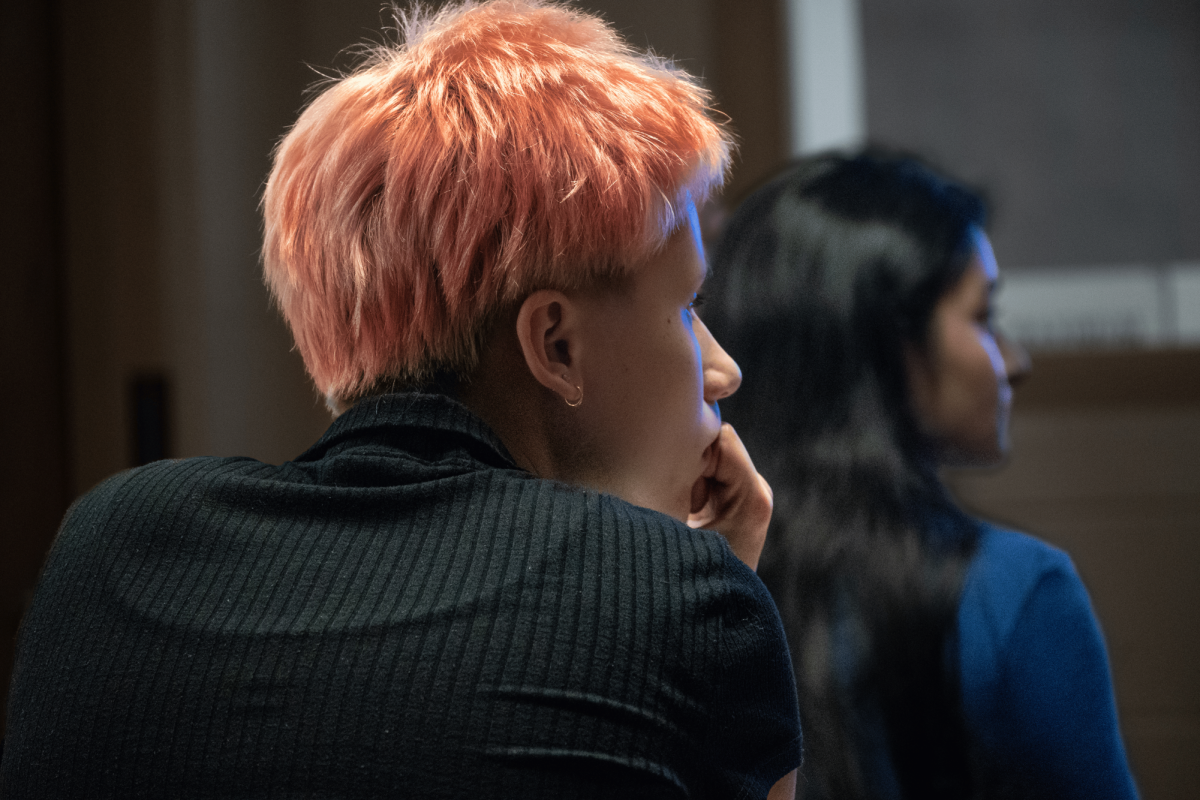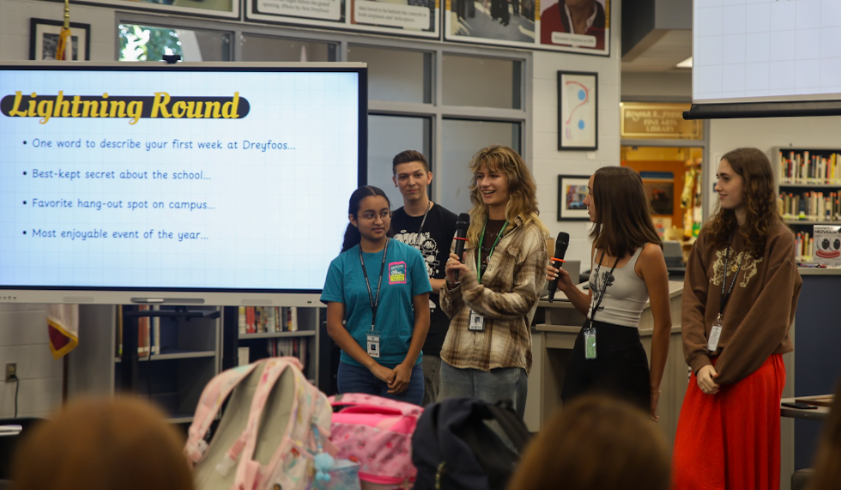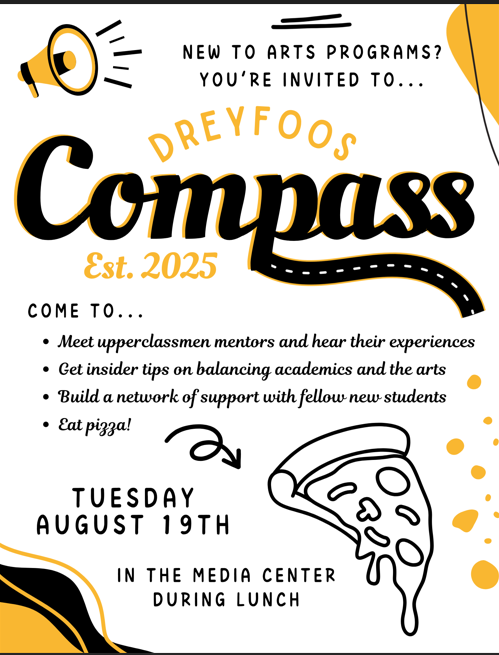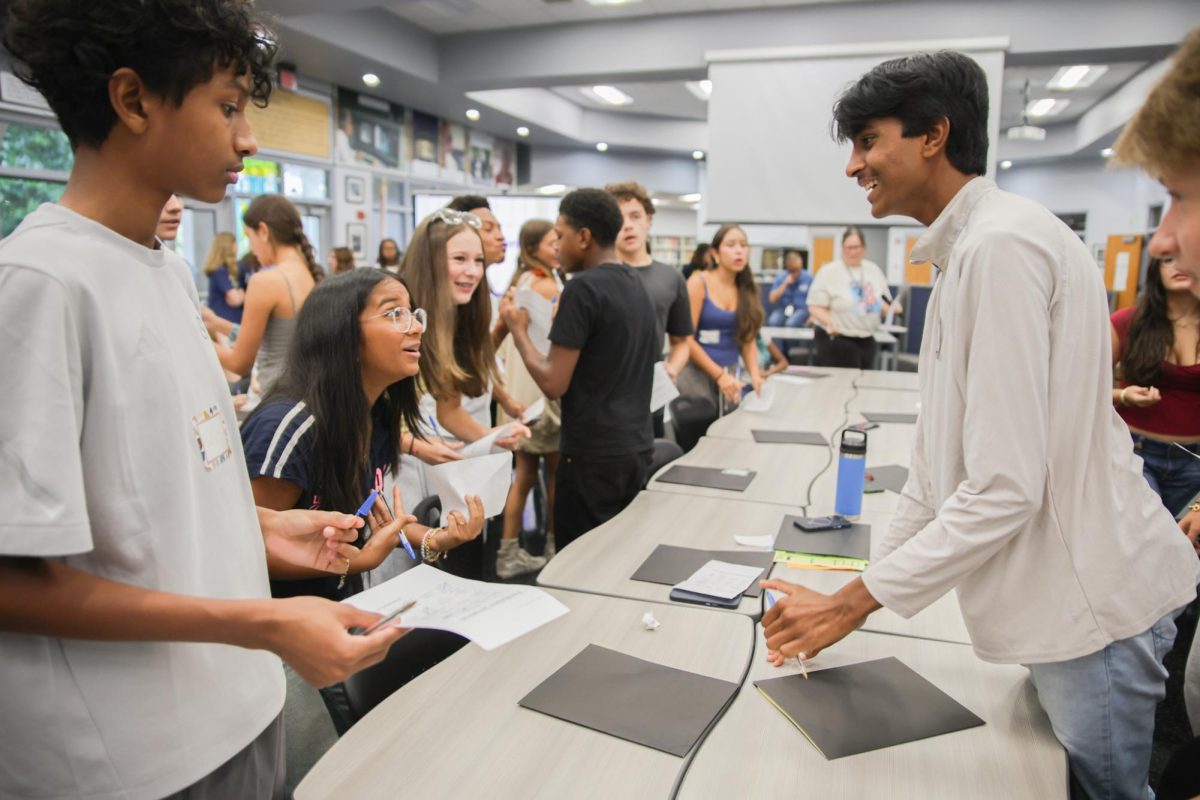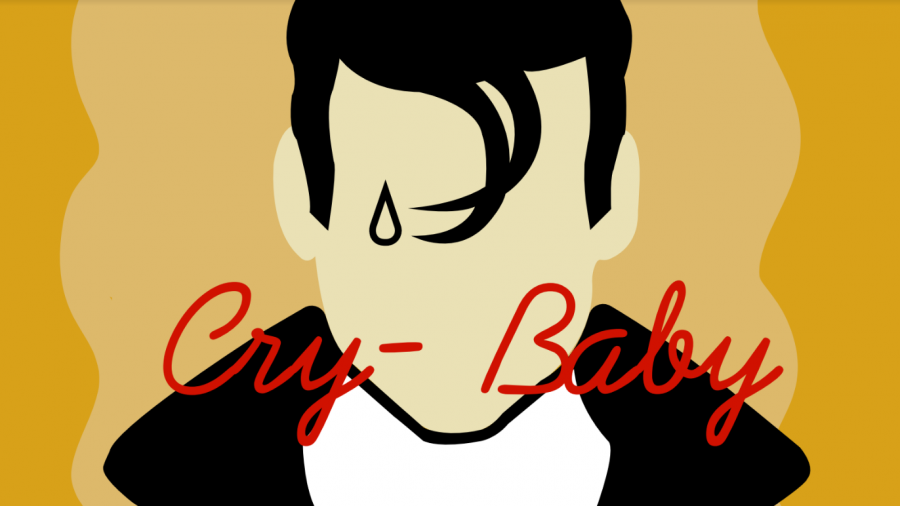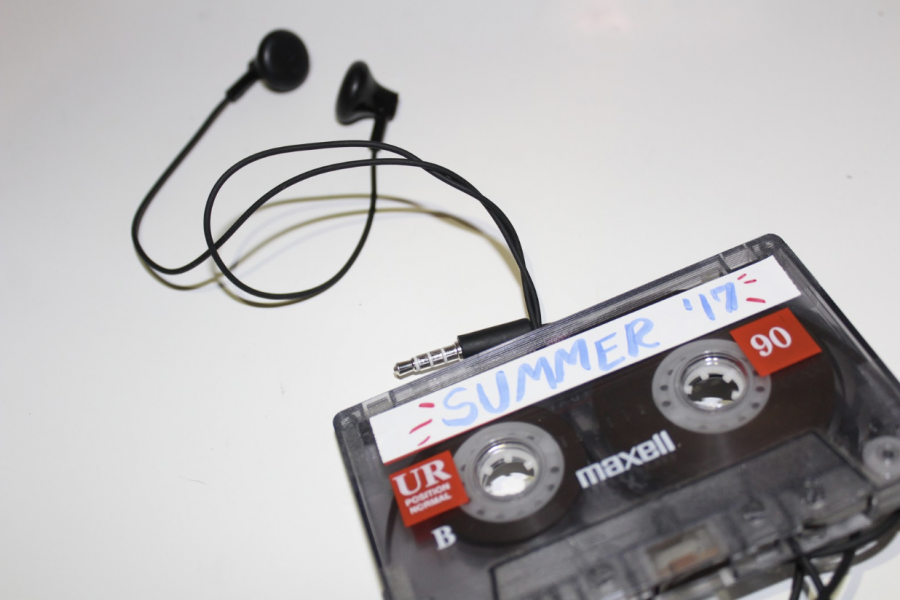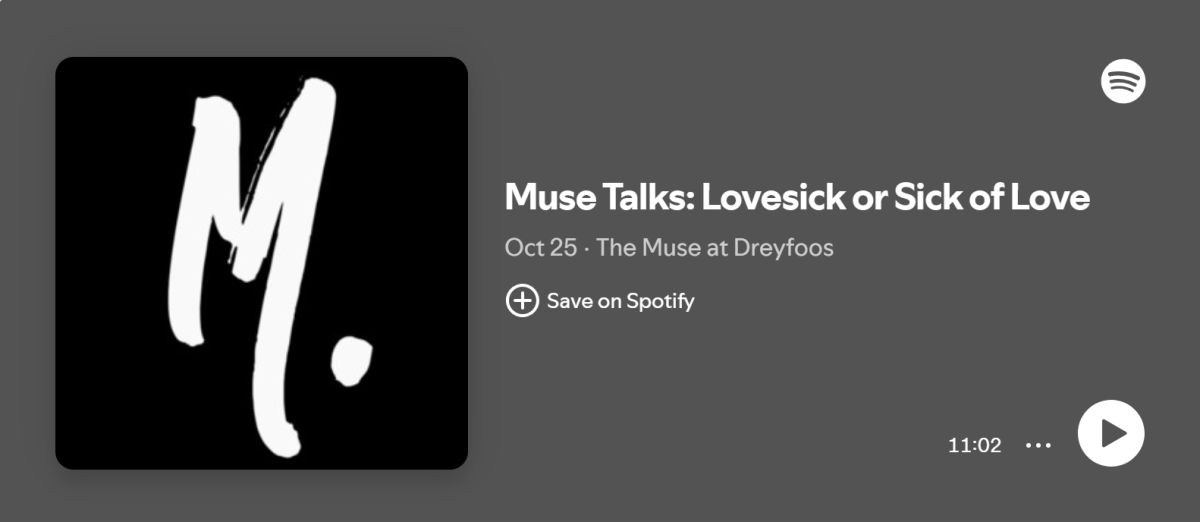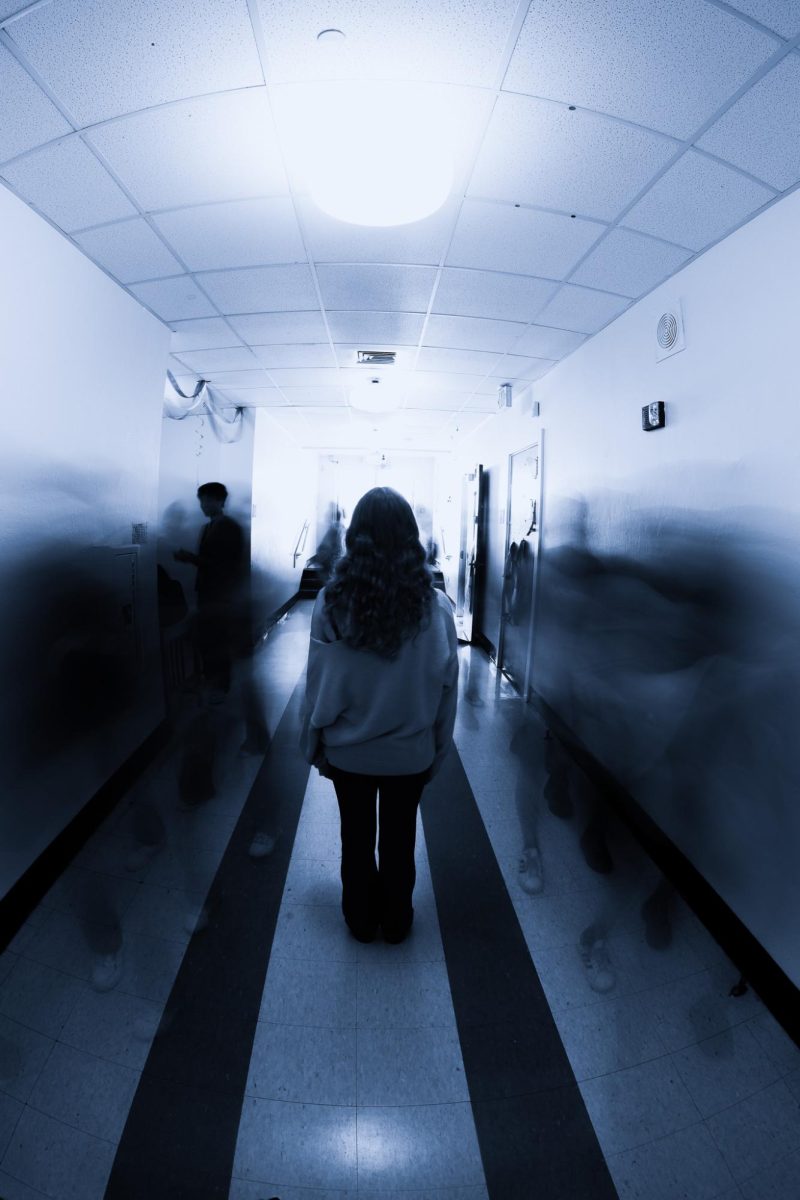In a crowded cafeteria, hundreds of people gather at different tables across the room. The sounds of laughter and conversations echo between the four walls as groups of people switch back and forth from topics of conversation at a rapid-fire pace. In the middle of a group sits a student, glossy-eyed and head down. Their friends’ chatter is heard but not processed as they stare at the white tiles on the ground, intently studying the cracks and waiting for the minutes to pass by, one agonizing second at a time.
According to Frontiers in Psychology, “loneliness, the subjective distress of feeling alone, has a strong impact on wellbeing and health.” This feeling affects all demographics and, because of its subjective nature, affects each individual’s physical and mental health differently. Teenagers and young adults are experiencing loneliness in record numbers.
In a casual survey conducted by The Muse, 61.5% of students surveyed said they feel “a little” to “very/fairly” lonely. When compared to a recent Meta-Gallup survey, which took data from 142 countries and territories, students at the school expressed higher levels of loneliness than other teenagers. Meta-Gallup findings show that 55% of people aged 15-18 said they feel “a little” to “very/fairly” lonely, with teenagers having the highest percentage of loneliness from all age groups surveyed.
“Loneliness is a new topic that (wasn’t) even addressed at medical school,” neurologist Craig Senzon, M.D., said. “It truly is becoming an epidemic, and (it’s) changing the way we practice medicine. It affects many different facets of things that I treat.”
Bearer of Bad News
Loneliness is not often considered a mental health issue by itself. But since it correlates so closely to other mental health issues, such as anxiety and depression, the presence of loneliness in people’s lives can negatively impact their physical well-being. According to a survey from the Center of Disease Control and Prevention, people who experience frequent loneliness are more susceptible to certain health effects like heart disease, stroke, and type 2 diabetes.
“I definitely think we are struggling with increased rates of anxiety in our student body, but it’s also something that we’re seeing across the district as well,” School District of Palm Beach County psychologist Tiffany Kerzner said. “I think these are also nationwide trends we’ve been seeing since the start of COVID as well. So we’re having these (internalized) disorders of feeling anxious, alone, (and) depressed, and not necessarily having the tools to deal with it.”
Different demographics might have variations in severity of loneliness. In older adults, things like living alone or without close family members might trigger emotional loneliness, which can increase the risk for dementia by 50%, according to a new advisory by the U.S Surgeon General. On the contrary, teenagers and young adults might feel situational loneliness, where they feel intense feelings of loneliness near certain events, anywhere from holidays to school-related activities. In a casual survey from The Muse asking when students feel most stressed, 27% of students said midterms and testing season.
“It takes a lot of your social life because you’re basically studying for tests all the time,” theatre freshman Harper Toolan said. “It gives you less time to socialize with people at school because your time is now just confined to testing, and I think that can make you feel more lonely.”
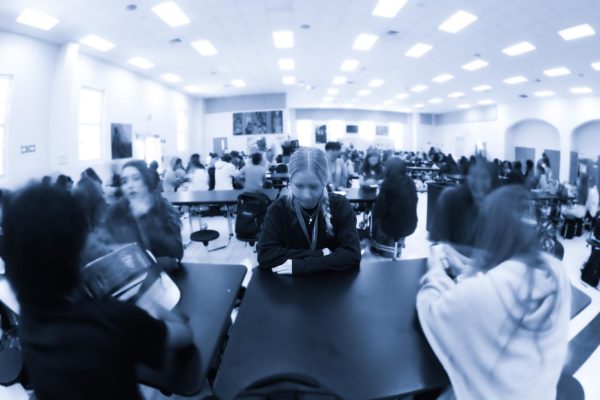
Endlessly scrolling
The COVID-19 pandemic incited many changes, such as stay-at-home orders and lockdown policies, which effectively separated communities, accelerating “trends in declining social participation” according to a new advisory by the U.S Surgeon General. Theatre junior Shane Rainsburg described feeling as if he wasn’t able to meet new people until freshman year.
“(Eighth grade at) Bak (Middle School of the Arts) was the COVID year, and I did not go back in person,” Rainsburg said. “I don’t think too many people remembered who I was, so (COVID-19) did actually impact how I met people for a little bit.”
Ways to contact people have changed vastly due to technological innovations of the 21st century. Creating bonds through online spaces in social media, such as platforms like TikTok, Snapchat, and Instagram, allows people to reach out and find new friends. Social media is also a way to communicate with old friends and family more frequently. However, as social media opens many doors for new forms of communication, some people, such as Dr. Kerzner, think technology contributes to the problem of loneliness.
“There are studies about how the algorithm can impact the media that you are consuming, and it can be as easy as liking a video of someone who says they’re depressed and you relate to that,” Dr. Kerzner said. “So you like that TikTok, for example. Those things may begin to show up more on your feed and so you are being exposed to more content, good or bad. And we know that the content that you’re exposed to and the nature of it can impact your mood and impact you emotionally.”
93.2% of students use social media according to a casual survey by The Muse. Social media usage in people has risen to nearly 20% since the start of the pandemic, according to the National Institute of Health. Some teens, such as communications sophomore Gabriella Escobar, have developed habits that coincide with the frequent use of these platforms.
An Artist’s ‘Sacrifice’
Students who transferred schools in the middle of their high school years, such as Securing Sanity Club president and theatre senior Nailah Smith, can feel left out of social connections. Because of differences in previous schooling, connections may differ from student to student.
“I (switched schools) in the middle of junior year and I’m a senior now,” Smith said. “So it was really hard to adjust, you know, it’s a new environment. Everybody’s known each other since middle school, so I think a lot of the times (I have) isolated (myself).”
Additionally, since the school is an arts school, students are required to take a minimum of 2 classes dedicated to their art. Which can sometimes allow students from different majors less time to connect. Some students, like Rainsburg, feel like being separated from different majors can contribute to loneliness.
“Theatre is very connecting,” Rainsburg said. “But you know, there are some (times) where I’m working on my craft and, when you kind of separate yourself to focus on, for instance, your lines in a play, it can be a little lonely. In my experience, I definitely (have) found myself studying material or doing other things, and then I get a sense of separation from everyone.”
The school allows all students residing in Palm Beach County, a county composed of 39 different municipalities, to attend the school, no matter the city that they reside in. Consequently, some students find it difficult to connect with others outside of school. Students that reside in Jupiter, for example, might find it challenging to hang out with a friend who lives in Boca Raton nearly 40 miles away. 3% of students surveyed said that they experience loneliness the most during the summer months, May through August. The struggles that come with being separated by distance can cause students to find difficulty in developing close bonds with others.
“It’s hard because sometimes I’m not able to go to stuff that (my friends) do because I don’t live as close,” digital media freshman Kamila Lopez Mendoza said. “But I think even though we cannot see each other as often, it’s not gonna affect us. If we really want to see each other, we’re gonna find a way.”
Despite the differences that might cause students to stay isolated from one another, Club Rush, an event at the beginning of the school year, helps students connect with different clubs. This allows them to interact with one another in a non-formal setting, and form bonds over shared interests.
“I’m a big advocate for mental health, and I think loneliness definitely contributes to a lot of mental health issues we see in teenagers,” Psychology Club president and theatre sophomore Reese Ferry said. “My club provides a safe space for us to talk about that. (By) having guest speakers (give an) outside professional perspective of how they deal with teenagers can also provide us (with) information to help ourselves. So having that connection with psychology and similar interests can definitely help people.”
Despite loneliness being a factor for other serious concerns, it is important to note that there is a difference in feeling lonely and being alone. “Being alone is a state of being, while loneliness is a feeling,” according to Psychology Today. Some people might take solace in being alone and find themselves to maintain better mental and physical health in doing so, finding other ways to experience authentic connections.
“I feel like everybody isolates themselves, everybody feels lonely at times, and that’s perfectly normal,” Smith said. “A lot of the times when people feel like they’re lonely, they think that they’re all alone. But that’s not the case … I just feel like mental health is not talked about enough. And it’s very important to put our mental health and mind first. As a person, I’ve struggled with mental health myself, and I found something that works for me, (which is) helping others.”


